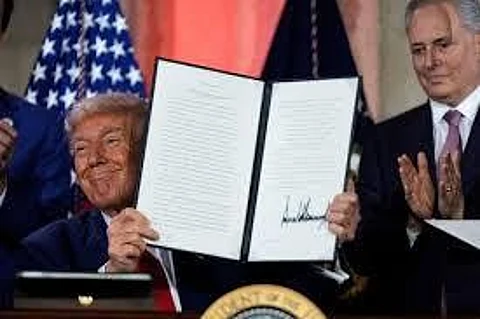

US President President Donald J. Trump delivered a keynote speech at the “Winning the AI Race” summit, organized by the All-In Podcast and the Hill & Valley Forum at the Andrew W. Mellon Auditorium. This event served as the backdrop for the launch of his administration’s “AI Action Plan,” a comprehensive strategy aimed at establishing U.S. leadership in artificial intelligence (AI).
Appeal for Nationalism in Tech
Trump emphasized that achieving success in the global AI arena necessitates a “new spirit of patriotism and national loyalty” within Silicon Valley. He called on technology companies to prioritize the interests of American workers.
Highlighting practices at major firms like Google and Microsoft, Trump condemned the trend of hiring talent from countries such as India, asserting, “Those days are over,” and advocating for a focus on American professionals.
The plan is structured around three main pillars: accelerating innovation, establishing U.S.-based AI infrastructure, and positioning American hardware and software as the global benchmark. It outlines deregulatory initiatives aimed at expediting data center development and enhancing U.S. AI exports.
Trump signed three executive orders to propel the AI initiative, including one directed at “woke” AI models, which he characterized as promoting “Marxist lunacy” and diversity ideologies. He stated that federal contracts will be restricted to companies that provide “objective” AI systems.
Trump stressed the necessity of maintaining an edge over China, cautioning that foreign control of AI technologies could jeopardize U.S. supremacy. “We will not live on a planet governed by the algorithms of our adversaries,” he asserted.
Reactions from Industry and the Public
The summit attracted influential figures from the tech sector, such as Nvidia’s Jensen Huang and OpenAI’s Sam Altman, indicating substantial industry interest.
Privacy advocates and labour unions, including the Electronic Privacy Information Center, voiced concerns about the plan's tendency to prioritize corporate interests over AI safety and workers' rights, calling for a “People’s Action Plan.”
The administration’s commitment to eradicating “ideological bias” in AI is fuelled by controversies like the 2024 incident involving Google’s AI image generator, which depicted diverse Founding Fathers and sparked backlash from conservative individuals.
Wider Implications of Trump’s Remarks
Trump’s remarks and the AI Action Plan indicate a pivot toward a more nationalistic approach to technology policy, emphasizing deregulation and domestic job growth. However, critics caution that neglecting global talent and relaxing environmental standards may stifle innovation and sustainability. The plan’s focus on “American values” in AI development raises critical questions around implementation and enforcement, particularly related to free speech and definitions of bias. The summit highlights the Trump administration’s ambition to position the U.S. as the “world capital” of AI, yet its effectiveness will hinge on finding equilibrium between industry interests and broader societal needs.
